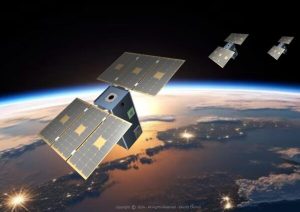The Spanish consortium – up to two will be selected by the European agency – will be lead by Madrid-based Elecnor Deimos with Spanish team members Satlantis, DHV Technology and Alén Space. other companies and universities will also be involved, such as Microwave Sensors (MWSE), Sateliot (Satelio Iot Services SL) and the Universitat Politècnica de Catalunya
The Atlantic Constellation will eventually consist of 16 satellites equipped with Earth observation and telecommunications payloads, which will be developed in collaboration with Portugal. It is part of the Aeroespace element of the Spanish Resilience and Recovery Plan (PERTE Aeroespacial).
In terms of contract responsibilities, Deimos will be overseeing the definition of the entire system, including the flight and ground segments, while Alén Space will handle the definition of the communications subsystem, the command and data handling subsystem and the RF payloads.
Satlantis will provide and manage the optical payloads, securing high quality Earth Observation data for the Spanish ecosystem, based on the experience as Copernicus Contributing Mission in the EU Copernicus program. And DHV Technology will be responsible for full Electrical Power System of the constellation including solar arrays and the electronic system.
The initial phase of the project spans three months under the supervision of the ESA, with the Spanish Space Agency (AEE) as the end customer. Following this “Consolidation” phase, one of the two consortiums will be selected for the “Implementation” phase of the eight satellites that constitute Spain’s contribution to the Constellation.
The Spanish Component of the Atlantic Constellation is funded by the Government of Spain through Ministry of Science, Innovation and Universities, Aerospace PERTE, and AEE.
“Following the award of Horizon Europe IOD/IOV satellites and DRACO, Deimos has consolidated its role as prime contractor of highly demanding small missions,” said Simone Centuori, CEO of Deimos. “The Atlantic Constellation definition is a decisive step forward in this direction, combining the moderate cost of small satellites with a solid engineering approach to ensure the optimal operation of a diverse payload suite.”
Atlantic Constellation
At the UK Space Conference 2023, which took place in Belfast, the UK government announced it’s intention to join the Atlantic Constellation. Along with Spain and Portugal, the UK will contribute a “pathfinder” satellite designed to aid early detection of climate change indicators.
This will be built by the UK space startup Open Cosmos with funding provided by the UK Space Agency.
With the agency providing £3 million of funding – along with with co-funding from Open Cosmos – four satellites will be launched in the same orbital plane and will constitute the first batch of the constellation.
The satellite built in the UK will be of the same design and launched in the same orbital plane as 3 others from Portugal constituting the first batch of the constellation, says the agency.
“This will significantly increase the frequency of revisit time at the beginning of the Constellation formation, offering valuable and regularly updated data, and supporting critical services such as the detection, monitoring and mitigation of natural disasters.”
Image: Elecnor Deimos
See also: Satlantis buys University of Cambridge spin-off SuperSharp in smallsat deal

